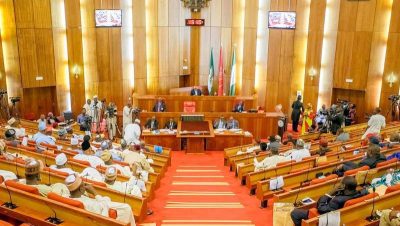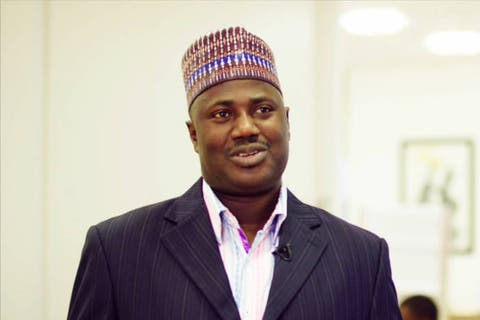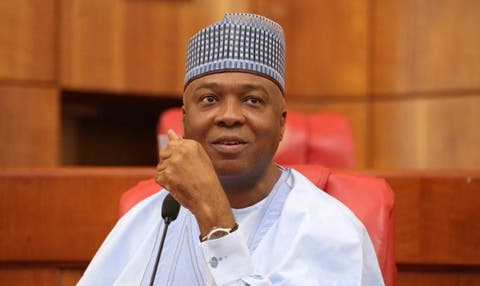EXCLUSIVE: How Nigerian Senators spend multi-million naira ‘jumbo pay’
N1.8 million on newspapers. N10 million for domestic trips. N1.5 million to maintain a computer — every three months.
A newly-obtained National Assembly spending document cited these and nine similar expenses as leading justifications for the multi-million naira payouts lawmakers rake in monthly or quarterly as “running cost”.
Titled “Application for the Retirement of Fund,” the document offers Nigerians a fair idea of how a typical Nigerian senator spends their running cost on what anti-corruption activists are describing as “misguided and wasteful” use of public funds.
PREMIUM TIMES obtained the document from a former senator who was in office between 2011 and 2015 when senators were still receiving N45 million quarterly. He asked that his identity be protected to avoid backlash from his constituents, serving lawmakers or their supporters.
Yet, his spending at the time, which remained exactly the same for two quarters, still reflects the prevailing pattern of how lawmakers use running cost, widely known by Nigerians as “jumbo pay”.
Cumulatively, the 109 lawmakers at the Senate received about N314 billion in so-called running cost between 1999 and 2016, and N53 billion so far within the past three years under President Muhammadu Buhari.
The expenses are several times what the Revenue Mobilization Allocation and Fiscal Commission (RMAFC) legally recommends for lawmakers. Also, there are provisions already for many of the items in the proper National Assembly budget.
The document surfaced in the wake of revelations by Shehu Sani, a senator from Kaduna State who said lawmakers earned N13.5 million monthly in running cost, provoking public anger at federal lawmakers for their profligate use of public funds.
Spending away illegally…
Mr Sani at the time explained that while lawmakers are not advised on how to spend the huge amount, they are expected to show evidence of how the money was spent.
That is “funds retirement” in public service parlance, and it is required for book-keeping. For the National Assembly, retiring funds is not meant to check frivolous spending but as a safeguard should external investigators show up in future.
The document obtained by PREMIUM TIMES is an example of how illegal quarterly or monthly receipts are retired by senators.
Our sources said for each line item filed, a senator or member of the House of Representatives is expected to submit receipts to support their humongous figures. The receipts are mostly forged as the spending cannot be reasonably justified, our sources said. That practice still continues today, they added.
First on the list of how the senator spent N45 million in 2012 within 90 days was N8 million that went on international travel. Local travels took N10 million.
The senator also blew N7.4 million on ‘contingency’ expenses.
Other expenses include office supplies, N3 million; maintenance of office equipment N1.6 million; postage; 500,000; hospitality; N6.8 million; printing press and consumables, N1.4 million; computer material consumables, N2 million and maintenance of motor vehicle, N1 million.
Put into context, a senator who gets N1.8 million for newspapers every 90 days would have purchased newspapers worth 20,000 per day.
Similarly, to spend N10 million on local trips within 90 days would require spending about N111,000 per day on road or air trips.
Each of these expenses is multiple times the legal limit set by RMAFC. By law, a senator has N202,640 to spend on newspapers, representing only 10 percent of annual basic salary of N2,026,400.00.
The commission also recommends only 50 percent of annual basic salary on car fueling and maintenance. This means that a senator has N1,013,200 to spend per year and not the N4 million being taken under the so-called running cost.
‘Corruption incorporated’
“This is corruption incorporated,” said anti-corruption activist, Armsfree Ajanaku. “This is a grand assault on the commonwealth on Nigerians. It is also a grand assault on the sensibility of long-suffering Nigerians who expect democracy to deliver good governance.”
Mr Ajanaku, a spokesperson for the Resource Centre for Human Rights and Civic Education (CHRICED), said lawmakers’ assault on public treasury is becoming increasingly worrisome, despite fervent expectations that things would gradually improve.
“Lawmakers are using all sort of frivolous spending to justify pilfering of people’s wealth,” Mr Ajanaku told PREMIUM TIMES by telephone Saturday night. “This is stealing, there’s no mincing words about it.”
“If they’re running their personal business, would they run it this way? Would they approve these kinds of cost? They see this as a free-for-all and they are going on to milk the public for as much as they could.”
Mr Ajanaku said while it is commendable that the media has been exposing the lawmakers’ spending for several years, there has been no commensurate result for the efforts.
“The effort of the media in bringing this and other illegal acts of lawmakers to light is highly commendable,” he said. “But the lawmakers have never changed and they have no plan of ever changing their ways.”
“The Nigerian people have another opportunity in 2019 to confront this people by themselves. If you return this caliber of people, this grand scale corruption would continue.
“But if the people could decide to vote for credible people, then we’ll be closer to being liberated from these characters,” he said.
PREMIUM TIMES contacted Aliyu Abdullahi, the spokesperson for the Senate, as well as seven other senators for comments about the expenses, but none of them responded.
Bode Gbadebo, an Abuja-based journalist, warned against reaching conclusions on National Assembly spending because it is difficult to track the activities of every member.
“You don’t know whether a lawmaker is given to constituency consultations, foreign travels and other activities,” Mr Gbadebo said. “There are a lot of them who are very active and there are a lot who are docile.”
Mr Badebo shared his views on the overall effects of the expenditure on the plurality of Nigerian, and urged lawmakers to be transparent and accountable in their use of earmarks.
“It is important that whatever amount they spend should be transparent. If you’re given N10 million but you spent only N5 million, transparency demands that you return the balance to the public treasury,” he said.
“They should also step up their activities so as to justify their pay, because it is difficult to tell how many laws they have passed that have direct impact on good governance. How many laws are they working on to tackle corruption?”
He said the focus should not be restricted to only the parliament, suggesting that the executive might be even worse.
“There should be a serious focus on how the executive is using public funds,” he said. “You would be shocked to learn that several government officials are taking expenses that are even more ridiculous to what is being uncovered at the legislative arm.”
Shrouded in secrecy
The Senate reached its peak of opaque spending under its former president, David Mark. It was under Mr Mark, who stepped down in 2015, that quarterly spending reached N45 million per senator, while total National Assembly climaxed at N150 billion.
Regardless of public outrage, the Mark-led National Assembly refused to disclose details of their costs.
Payment to senators was reduced to N13.5 million by the leadership of Bukola Saraki, who deviously made the payments monthly – to reduce the rate and assuage public revulsion.
But while the Senate under the Mr Saraki published details of the National Assembly for the first time in five years, it failed to include the running cost as a specific line item.
It remained unclear under which spending subhead the N13.5 monthly running cost was tucked, but it only marked a paltry reduction rather than the significant decreases that members promised to implement. (Premium Times)




